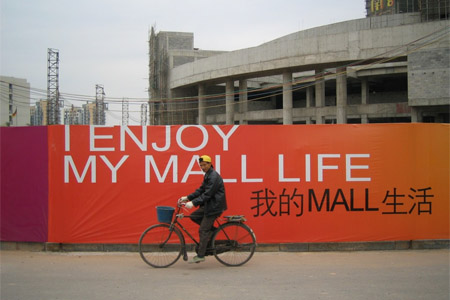[iframe width=”640″ height=”360″ src=”http://www.youtube.com/embed/Th4EN987Ngk” frameborder=”0″ allowfullscreen]
Director Sam Green knows a few things about utopia. His Oscar-nominated 2002 film The Weather Underground chronicled the film’s titular radical group’s violent path towards creating an ideal society; his new film The Love Song of R. Buckminster Fuller, screening at the San Francisco International Film Festival, revisits the futurist designer’s attempts to transform the landscape of the San Francisco Bay. (Celebrate Sam Green and other Fandor filmmakers in the 2012 San Francisco International Film Festival Thursday, April 26, 8-10 pm at Public Works, 161 Erie St, SF.)
Green’s utopian impulses not only affect the subjects he chooses to film, but also how he presents them to his audience. In 2009, Green and Dave Cerf went on a world tour of live screenings of four short films all dealing with Utopia, presented with live narration by Green and a live musical accompaniment performed by the band The Quavers. The touring show, known as Utopia in Four Movements, brought a fresh gust of innovation and energy to the theatrical experience of cinema, at a time when movie theaters are trying to reinvent themselves in the age of online movies. Green will continue his “live documentary” work by offering an in-person cinematic narration with live accompaniment by the band Yo La Tengo at his SFIFF screening of The Love Song of Buckminster Fuller.
What does it mean, then, that some of the short films from Green’s innovative Utopia performances are now available to watch online on Fandor? (The World’s Largest Shopping Mall and The Universal Language.) The occasion makes one pause to reflect on the qualitative differences between the theatrical and online experiences of movies. The point is raised by an essay by Rebecca Solnit, in which she posits the movie theater experience as a utopia in danger of fading out as online, small screen modes of viewing threaten to replace them:
A lot of us now look back at the golden age of cinema as a bygone paradise, a minor but sublime coexistence of strangers in the dark drawn together to see a flicker of projected light come to life onscreen. Television chopped up movies with commercials and put them in the middle of domestic distraction, but that was nothing compared to this moment when films are on your iPhone and your laptop and in fuzzy tiny windows on YouTube. The worst thing about these new modes of viewing isn’t that they diminish cinema as visual and imaginative spectacle. The worst thing is that they’re watched furtively and alone. Cinema, which was once a great banquet in a dream palace is now often a snack devoured absentmindedly in isolation. And only in society, only together, do we have the power to live out those old dreams, or new ones.
Is watching movies online a solitary, un-social experience that smacks of absent-minded consumption and a diminished appreciation of what’s being watched? The following video is offered as a counterpoint to show what special qualities can be gotten from watching a movie online, in a way that demonstrates interactivity, sociability and an enhanced appreciation of the movies. It is also filmed in real time, as a way to pay tribute to the live, in-the-moment experience experienced in Green’s Utopia performances. Perhaps the real point of this video is that, whether you’re in a movie theater or in front of a computer, the experience of being “live,” like utopia itself, may not be tied to a place, but to a state of mind.




